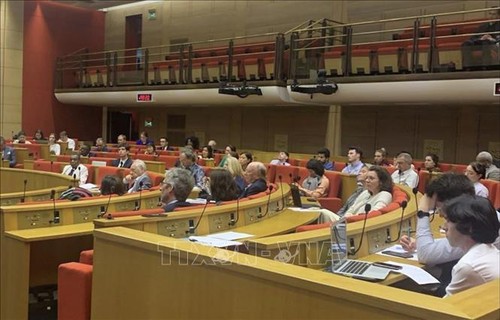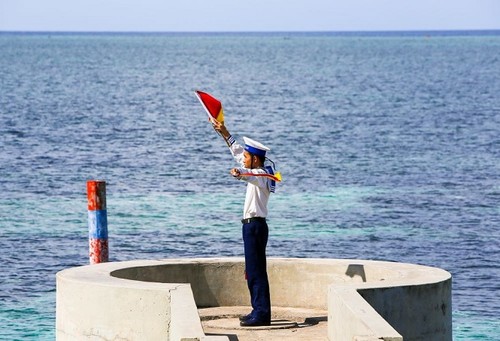 Experts and politicians attend the workshop on the East Sea at the French Senate in Paris on May 26. (Photo: VNA) Experts and politicians attend the workshop on the East Sea at the French Senate in Paris on May 26. (Photo: VNA) |
The workshop organizer said the East Sea poses potential risks of becoming a global hot spot. Countries like France need to be fully aware of the role and importance of the East Sea and challenges in the region. The workshop was not intended to solve the problem but to provide information concerning international law, including UNCLOS, to reduce tension in the East Sea.
Identifying challenges in the East Sea
High on the agenda were the Indo-Pacific space in light of UNCLOS, the East Sea as the focal point of security, climate change as a crisis factor in the Indo-Pacific region, and the role of France. Presentations at the workshop provided up-to-date, objective information and warnings about possible negative developments in the East Sea, the importance of ensuring peace, stability, security and freedom of navigation in the East Sea, the need to respect and implement UNCLOS, regional countries’ commitments, and the 2002 Declaration on the Conduct of Parties in the East Sea (DOC).
Participants called on the international community, particularly France and the European Union, to play a role in resolving regional disputes and disagreements on the basis of international law and UNCLOS, and expanding international cooperation frameworks.
 A Vietnamese naval soldier (photo: baoquocte.vn) A Vietnamese naval soldier (photo: baoquocte.vn) |
1982 UNCLOS, important legal document to maintain stability in the East Sea
The creation of UNCLOS in 1982 laid a foundation to establish a new international order at sea. It embodies clear, specific, and detailed principles to address marine disputes.
Through UNCLOS, many separate mechanisms for settling disputes at sea have been created, such as the Committee for Mediation and Arbitration, and the International Tribunal for the Law of the Sea (ITLOS). For the first time, a mandatory dispute settlement mechanism through conciliation and arbitration has been adopted and implemented. These mechanisms have contributed to compliance with UNCLOS, and created a basis for states to settle disputes at sea peacefully.
Under UNCLOS, a member state is entitled to choose one or more mechanisms to settle disputes, such as ITLOS, the International Court of Justice (ICJ) or an arbitration court established under Annex VII or Annex VIII of the Convention. ITLOS is a dispute settlement body that has jurisdiction over all disputes related to the interpretation and application of UNCLOS. Since the birth of UNCLOS, ITLOS has resolved approximately 30 disputes pertaining to fishing, marine environmental protection, and maritime delimitation. The ICJ has handled some 20 cases, while the arbitration court established under UNCLOS’ Annex VII has handled more than 10 cases.
Countries which have not ratified UNCLOS can refer to the Convention to formulate and implement their maritime policies and resolve disputes and disagreements.
UNCLOS has become the sole international legal framework for all maritime activities. The Convention has been frequently referred to and applied to settle maritime-related disputes, particularly in the Asia-Pacific region, where there are many hot spots for maritime disputes in the East Sea and the East China Sea.
The workshop participants agreed that peace, stability and sustainable development in the East Sea require the constant attention of the international community, and respecting and complying with UNCLOS 1982 is a prerequisite.